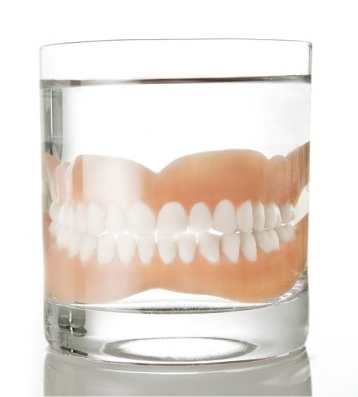PRINTED IN TCI WEEKLY NEWS
August 11, 2012
 Dentures, bridges and implants, are the three options that are available to replace missing teeth. In this article I want to focus on dentures (‘false teeth’), which are removable devices that can replace one, several or all of your teeth.
Dentures, bridges and implants, are the three options that are available to replace missing teeth. In this article I want to focus on dentures (‘false teeth’), which are removable devices that can replace one, several or all of your teeth.
There are several factors that will determine whether dentures are the best solution for you. Your dentist will be able to advise you but in general a denture might the most suitable route for you if, i) there has been significant loss of bone, ii) the remaining teeth are failing, iii) budget is limited.
Partial dentures
Partial dentures can be used to replace anything from one tooth to nearly all teeth in the arch (jaw) although the design and construction will depend on exactly what is remaining in the jaw.
Single tooth denture
The simplest form of denture is a flipper or spoon denture. This is a plastic (acrylic) denture that is used in the upper jaw often to replace a single missing front tooth. This may be used as a temporary solution while a bridge or implant restoration is being constructed or can be a low cost longer term solution. Relative to a bridge or an implant this is a cheaper solution and for many is preferable to a gap. However, the downside is that it is not fixed in and can therefore be liable to move or even drop out completely.
Multiple tooth partial denture
A partial denture to replace multiple missing teeth is a more complex design and can incorporate clasps/clips to help keep the denture firmly in place. The denture can be made of plastic (acrylic) and have wire clips or can be a cast metal framework with the teeth mounted in gum coloured acrylic.
The metal framework is a much stronger design than the acrylic-only and can be made as a skeleton frame and in much thinner section to reduce the bulk in the mouth. Metal dentures tend to rest on the adjacent teeth and clip more firmly in place and so are less likely to move and rub against remaining teeth.
Full dentures
If you have no teeth at all a full denture may be the most suitable choice. These are almost always made of acrylic although sometimes a metal strengthener can be built into the denture base in increase durability. When teeth are lost the bone that was supporting the teeth also reduces over time and the denture is designed to replace both the teeth and the lost bone/gum. Full upper dentures tend to stay in place quite well as it is possible to get suction against the palate. Lower full dentures can be liable to move as the tongue and floor of the mouth are much more mobile and this can give rise to the ‘clacking’ noise that can sometimes happen with people who wear dentures. Patients learn to control dentures with their tongue and can use denture adhesive to help.
If denture movement is a problem it may be possible to place implants in the bone and then make a denture that clips on to the implants to keep it stable.
In the long term
Dentures can be a long term solution but any patient considering them as an option should be aware that over time the bone which supported the original teeth will continue to reduce and thus the denture will fit less well and will ‘sink’ relative to the adjacent teeth. You will also find that the acrylic will wear down. Therefore over the long term it should be expected that the dentures will require repair and/or replacement.
Mark Osmond BDS (Lond) LDS RCS (Eng)
Mark Osmond Dental Clinic
(649) 432 3777
drmosmond@gmail.com or Find us on Facebook